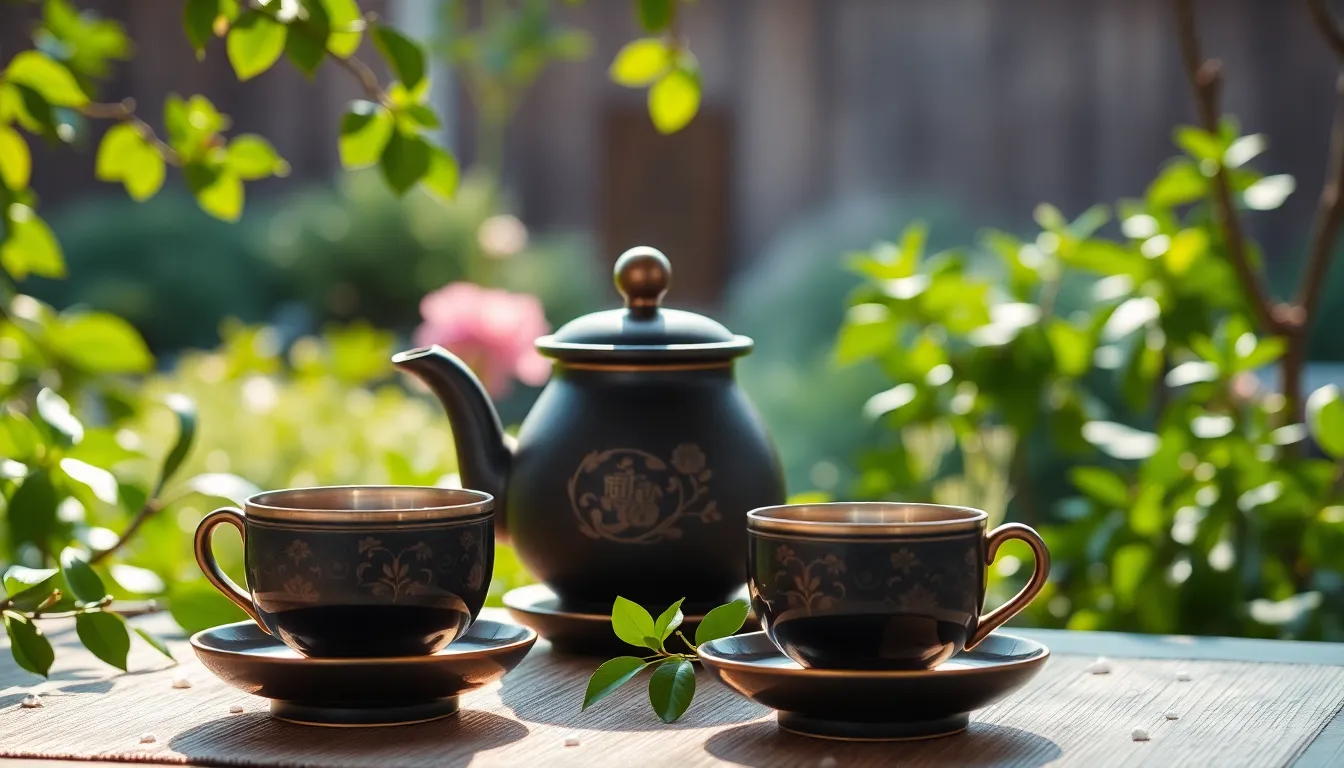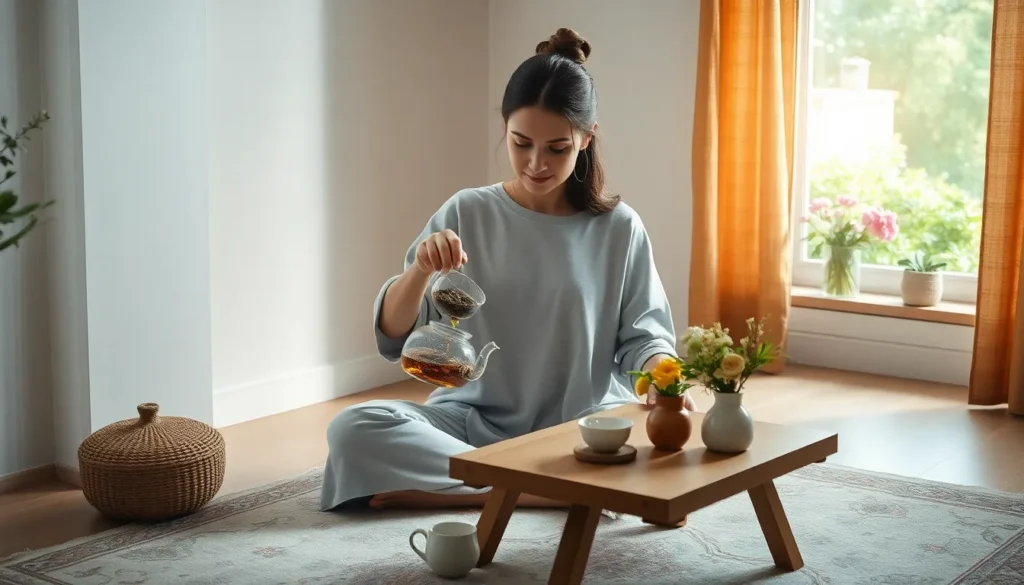Table of Contents
ToggleIn a world buzzing with chaos, tea offers a delicious escape that’s both soothing and invigorating. Picture this: a steaming cup cradled in your hands, the aroma wafting through the air, and suddenly, the noise fades away. Mindful rituals of tea aren’t just about sipping; they’re an art form that invites tranquility into daily life.
Overview of Mindful Rituals of Tea
Mindful rituals of tea serve as a pathway to tranquility amid daily chaos. These practices encourage individuals to slow down and appreciate each moment, fostering a deeper connection with the beverage. The process often begins with selecting quality tea leaves, which impacts flavor and aroma. Each type, whether green, black, or herbal, brings unique characteristics that enhance the overall experience.
Preparation becomes an opportunity for mindfulness. Boiling water, measuring tea, and steeping each infusion transforms the routine into a thoughtful ritual. Observing color changes and inhaling fragrant steam promotes sensory engagement, sharpening the focus. It’s essential to pay attention to temperature and timing, as these factors significantly influence taste.
Serving tea in a dedicated space cultivates an inviting atmosphere. Using beautiful teacups and cozy textiles adds to the experience, making each moment feel special. Sharing tea with others enhances connection, creating opportunities for conversation and bonding. Engaging in this ritual with family or friends turns an ordinary afternoon into a cherished experience.
Each sip invites reflection, allowing time for thoughts and feelings to arise. Taking pauses between sips offers a chance to appreciate flavors while practicing gratitude for the moment. Incorporating intentions, such as mindfulness or relaxation, creates a purposeful experience leading to mental clarity.
Regularly practicing these rituals establishes a calming habit. Increased awareness and intentionality contribute to reduced stress and greater enjoyment of life’s simple moments. Engaging with tea mindfully nurtures both well-being and connection, marking it as a valuable practice in daily routines.
The History of Tea and Mindfulness

Tea’s rich history intertwines with practices of mindfulness across various cultures. This ancient beverage, revered for its calming properties, offers insights into the connection between tea and tranquility.
Origins of Tea in Different Cultures
China’s history of tea dates back to 2737 BCE when Emperor Shen Nong discovered the drink. Japanese tea ceremonies, established in the 9th century, emphasize harmony, respect, purity, and tranquility. In India, chai evolved from traditional Ayurvedic practices, combining tea with spices for holistic benefits. Each culture infuses its traditions into tea consumption, reflecting their values and approaches to mindfulness.
The Evolution of Mindful Drinking
Mindful drinking has roots in historical customs that emphasize presence and appreciation. The shift from casual consumption to intentional engagement occurred during the Tang and Song dynasties in China, promoting awareness in tea preparation and enjoyment. Modern practices encourage individuals to savor each sip, focusing on flavor profiles and aromas. This evolution reflects a growing recognition of mindfulness in a fast-paced world, where tea serves as a tool for stress reduction and clarity.
The Benefits of Mindful Tea Rituals
Mindful tea rituals offer various benefits that enhance both physical and mental well-being. Engaging in these rituals fosters a deeper connection to the present moment and promotes tranquility.
Physical Benefits
Drinking tea provides hydration, crucial for overall health. Studies show that specific teas, like green and black, contain antioxidants, strengthening the immune system. Incorporating mindful tea practices can lower blood pressure, contributing to heart health. Preparing tea with attention increases metabolic rates, aiding digestion. Engaging in rituals encourages slower sipping, promoting better absorption of nutrients. The warmth of tea calms the digestive system, enhancing comfort after meals. Aligning these practices with quality leaves elevates the sensory experience.
Mental and Emotional Benefits
Mindfulness during tea rituals aids stress reduction, leading to improved mental clarity. Taking time to focus on the aroma and taste encourages relaxation, which lowers anxiety levels. Rituals foster gratitude, allowing individuals to appreciate small moments. Intentional pauses during tea consumption enhance reflection, supporting emotional resilience. Sharing tea with others builds connections, encouraging meaningful conversations. Engaging in daily rituals creates a sense of stability, which contributes to a balanced emotional state. These practices transform tea drinking into a valuable tool for nurturing mental well-being.
Creating Your Own Mindful Tea Ritual
Creating a mindful tea ritual involves intentional steps that enhance the experience. Individuals can transform their tea moments into meaningful practices by focusing on details.
Selecting the Right Tea
Choosing quality tea leaves is essential for a rich experience. Different tea types, such as green, black, or herbal, provide unique flavors and benefits. Green tea offers antioxidants, while chamomile promotes relaxation. Exploring various brands encourages discovering personal preferences. Freshness significantly impacts taste; selecting loose leaf options often enhances aroma and flavor. When individuals prioritize organic selections, they support sustainable practices and enjoy a purer taste.
Setting the Perfect Environment
The environment plays a crucial role in enhancing the tea ritual. Creating a quiet and serene space fosters mindfulness during tea preparation and consumption. Soft lighting and comfortable seating can maximize comfort and relaxation. Incorporating calming elements, like plants or calming music, enhances focus. Individuals may also consider using a dedicated tea set to elevate the experience. Personalizing the space, such as adding sentimental items, cultivates a deeper connection to the ritual. Sipping tea in a tranquil environment invites reflection and gratitude.
Mindful Tea Practices from Around the World
Various cultures embrace mindful tea rituals, each offering unique insights into the practice. Exploring these traditions reveals the profound connections tea fosters among individuals and communities.
Japanese Tea Ceremony
The Japanese tea ceremony, known as Chanoyu, emphasizes harmony, respect, purity, and tranquility. Participants engage in the meticulous preparation and presentation of matcha, allowing them to experience the moment fully. Each movement during the ceremony is deliberate, encouraging mindfulness and reflection. The setting often includes serene gardens, enhancing the atmosphere. Guests are invited to appreciate the aesthetics of the tea utensils and the surrounding environment. This ritual not only nurtures relationships but also cultivates inner peace, making tea an integral part of Japanese culture. Overall, the ceremony beautifully intertwines art, philosophy, and nature, presenting a profound approach to mindfulness.
British Afternoon Tea
British afternoon tea presents a delightful way to slow down and savor moments with friends and family. Typically served between 3 PM and 5 PM, this practice includes a selection of tea alongside an assortment of pastries, sandwiches, and scones. Participants enjoy the ritual of preparing tea, selecting preferred blends, and combining it with delightful treats. Conversations flow freely, fostering connections amidst the gentle clinking of teacups. Moreover, the ambience of a cozy tearoom or a garden enhances the experience. This cherished tradition encourages individuals to pause during busy days, promoting social interaction while celebrating the simple joys of life. Overall, British afternoon tea exemplifies mindfulness through shared experiences and quality moments.
Embracing mindful rituals of tea offers a unique opportunity to cultivate tranquility in an often chaotic world. By engaging in this practice, individuals can find solace in the simple act of brewing and savoring each cup. The intentionality behind selecting quality leaves and creating a serene environment enhances both the experience and the benefits.
As tea becomes a cherished part of daily routines, it fosters connections with others and nurtures emotional well-being. This journey through the world of tea not only promotes physical health but also invites deeper reflection and gratitude. Ultimately, the mindful engagement with tea serves as a gentle reminder to slow down and appreciate life’s fleeting moments.







